外研版(2019)英语必修第三册Unit 5 What an Adventure! Understanding ideas 课件(共28张PPT)
文档属性
| 名称 | 外研版(2019)英语必修第三册Unit 5 What an Adventure! Understanding ideas 课件(共28张PPT) |
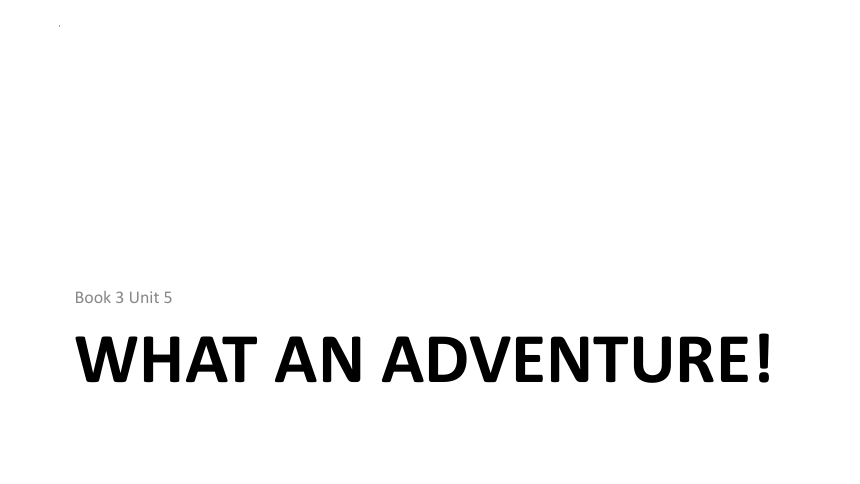
|
|
| 格式 | pptx | ||
| 文件大小 | 6.0MB | ||
| 资源类型 | 教案 | ||
| 版本资源 | 外研版(2019) | ||
| 科目 | 英语 | ||
| 更新时间 | 2024-07-16 00:00:00 | ||
图片预览

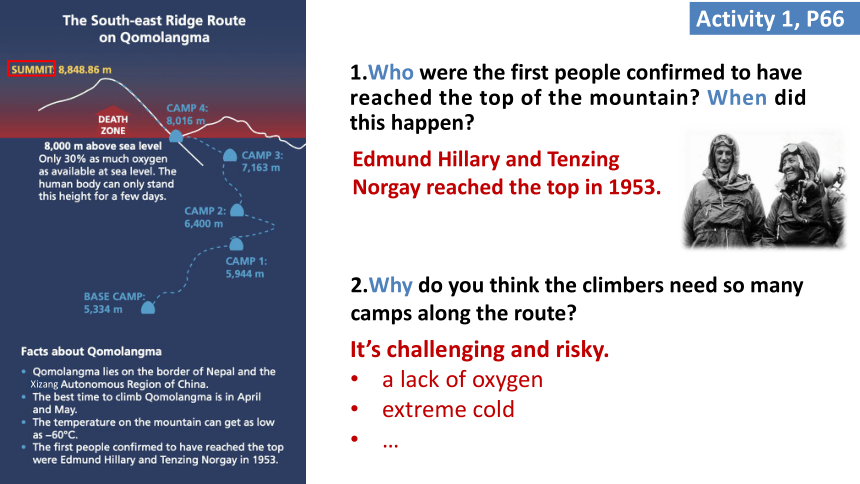
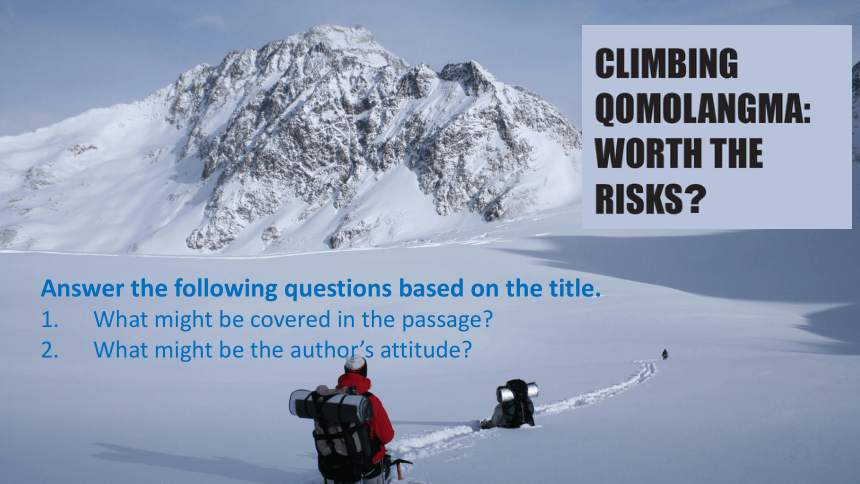
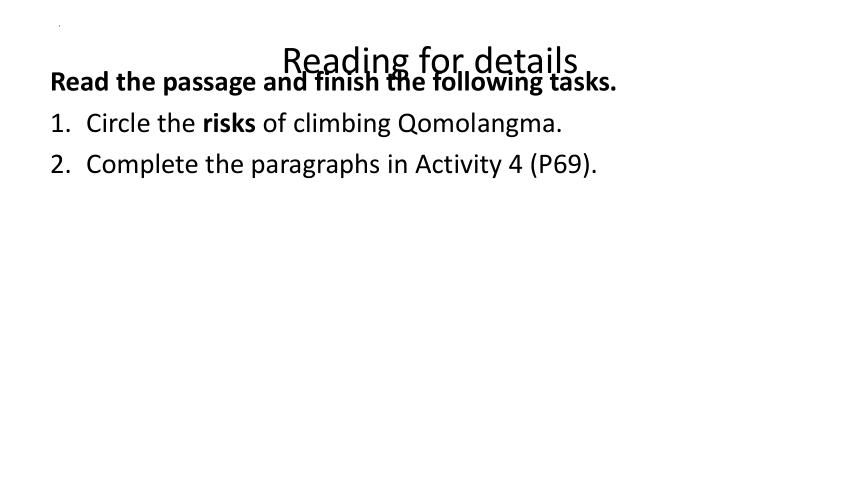
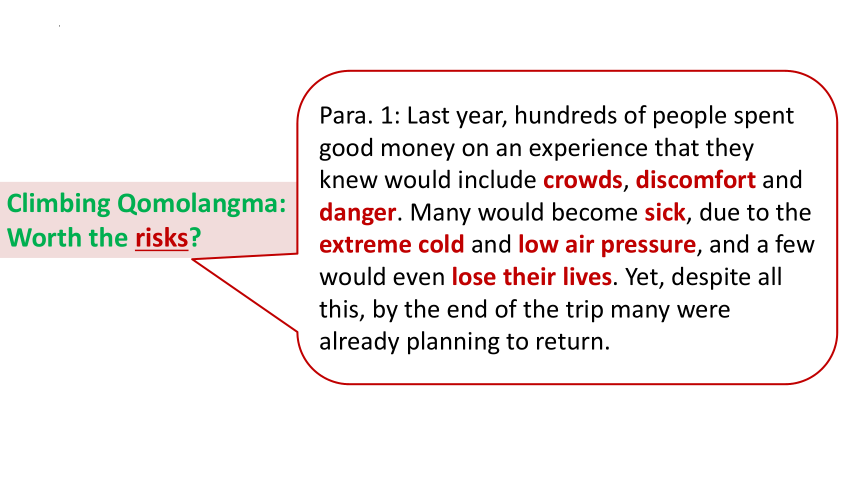
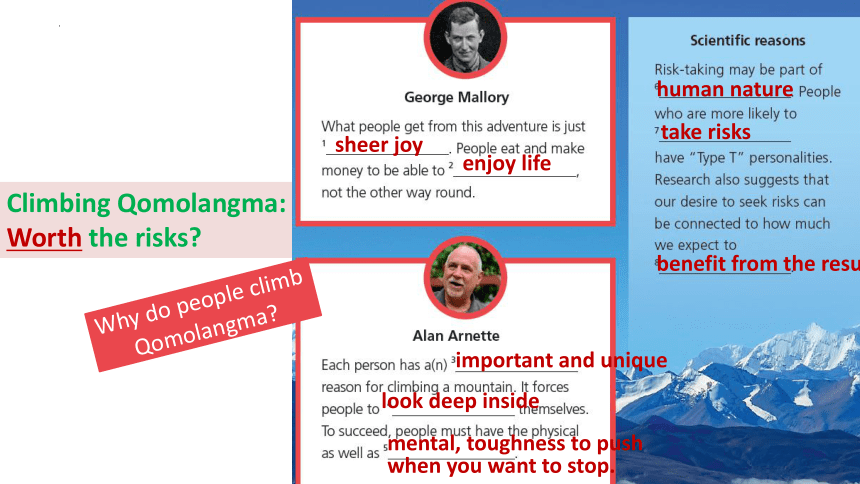
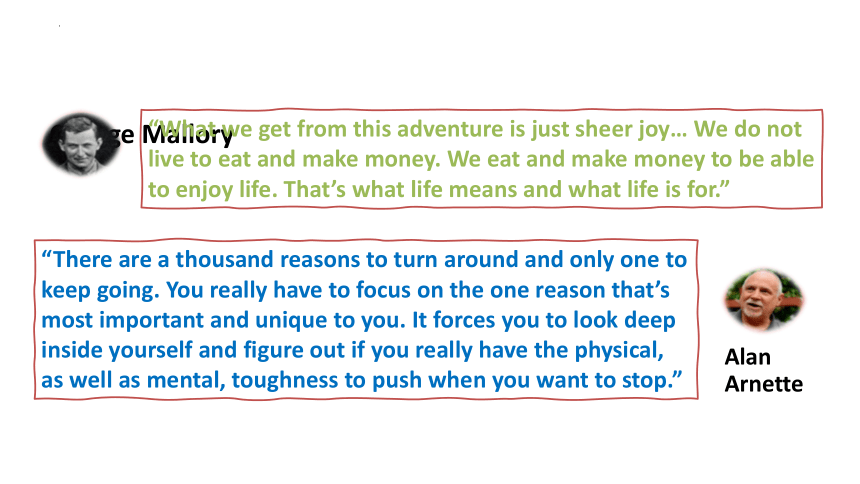
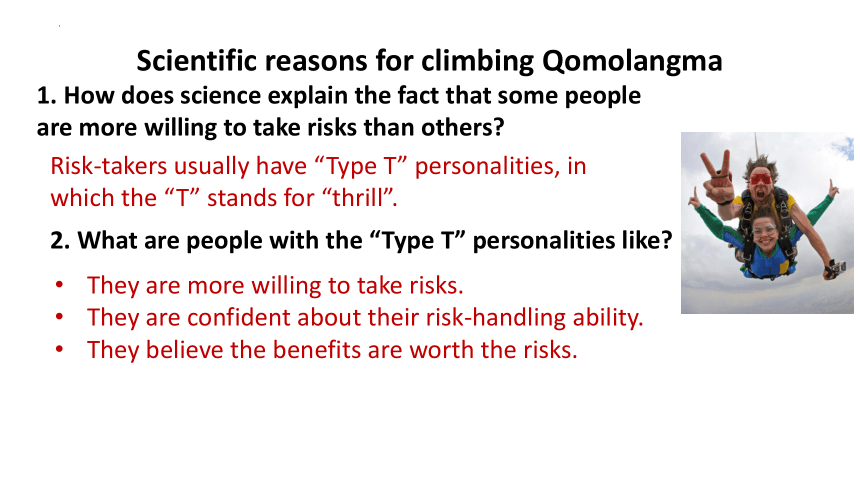
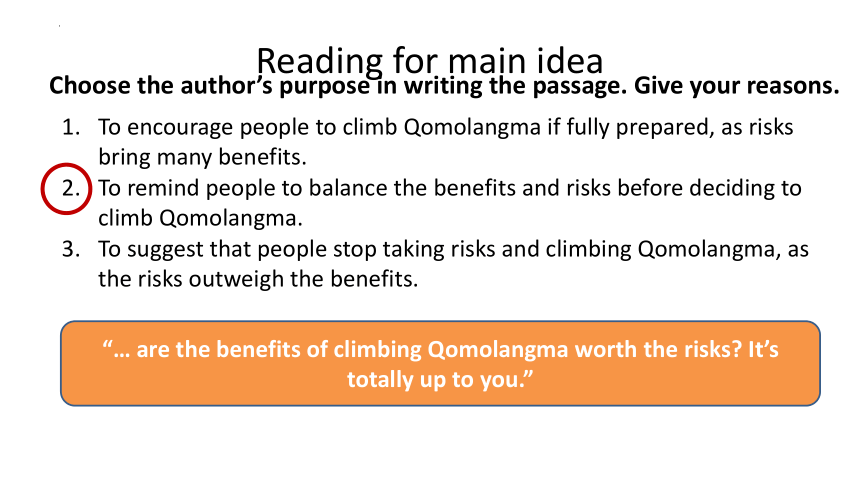
文档简介
(共28张PPT)
what an adventure!
Book 3 Unit 5
1.Who were the first people confirmed to have reached the top of the mountain When did this happen
2.Why do you think the climbers need so many camps along the route
It’s challenging and risky.
a lack of oxygen
extreme cold
…
Activity 1, P66
Edmund Hillary and Tenzing Norgay reached the top in 1953.
Answer the following questions based on the title.
What might be covered in the passage
What might be the author’s attitude
Reading for details
Read the passage and finish the following tasks.
Circle the risks of climbing Qomolangma.
Complete the paragraphs in Activity 4 (P69).
Climbing Qomolangma: Worth the risks
Para. 1: Last year, hundreds of people spent good money on an experience that they knew would include crowds, discomfort and danger. Many would become sick, due to the extreme cold and low air pressure, and a few would even lose their lives. Yet, despite all this, by the end of the trip many were already planning to return.
Climbing Qomolangma: Worth the risks
Why do people climb Qomolangma
sheer joy
enjoy life
important and unique
look deep inside
mental, toughness to push when you want to stop.
human nature
take risks
benefit from the result
Personal reasons for climbing Qomolangma
George Mallory
Alan Arnette
“What we get from this adventure is just sheer joy… We do not live to eat and make money. We eat and make money to be able to enjoy life. That’s what life means and what life is for.”
“There are a thousand reasons to turn around and only one to keep going. You really have to focus on the one reason that’s most important and unique to you. It forces you to look deep inside yourself and figure out if you really have the physical, as well as mental, toughness to push when you want to stop.”
Scientific reasons for climbing Qomolangma
1. How does science explain the fact that some people are more willing to take risks than others
Risk-takers usually have “Type T” personalities, in which the “T” stands for “thrill”.
2. What are people with the “Type T” personalities like
They are more willing to take risks.
They are confident about their risk-handling ability.
They believe the benefits are worth the risks.
Reading for main idea
To encourage people to climb Qomolangma if fully prepared, as risks bring many benefits.
To remind people to balance the benefits and risks before deciding to climb Qomolangma.
To suggest that people stop taking risks and climbing Qomolangma, as the risks outweigh the benefits.
Choose the author’s purpose in writing the passage. Give your reasons.
“… are the benefits of climbing Qomolangma worth the risks It’s totally up to you.”
What’s your answer
The best view comes after the hardest climb.
“According to incomplete statistics, a total of 425 outdoor adventure accidents occurred in 2023, involving 1350 people, 320 injured, 156 dead, and 26 missing.”
2023年7月28日:一车队非法穿越罗布泊导致4人死亡事件
2023年10月9日:洞穴深潜亚洲纪录者韩颋深潜失联超30小时
2024年6月2日:浙江2名游客横渡溪流被冲走
2024年6月12日:游客在瓦屋山被落石砸中身亡
Useful expressions (p.66—p.68)
在边境线上
被证实
spend good money on…
独一无二的经历
记述
纯粹的快乐
成功做某事
与……相似
使……对焦/变得清楚
试图……
导致
研究表明
冒险
on the border
be confirmed to do
把大把的钱花在……上
an experience like no other
write of/about
sheer joy
succeed in doing
be similar to
bring … into focus
attempt to do
result in
studies indicate that…/research suggests that…
take risks
Useful expressions (p.66—p.68)
将……称作……
代表
期望……
与……有关
受益于
取决于
风险大于收益
refer to…as…
stand for
expect to do
be connected to
benefit from
be up to sb.
the risks outweigh the benefits
复习:with的复合结构
With the majority of attempts to climb Qomolangma __________ (result) either in total success or failure, is there also a scientific reason behind this risk-taking
Recent studies indicate that risk-taking may be part of human nature, ______ some of us more likely to take risks than others.
He refers to the personalities of these people as “Type T”, with the “T” __________ (stand) for “thrill”.
With this ______ mind, are the benefits of climbing Qomolangma worth the risks
“with + 宾语 +宾语补足语”结构常放于句首或句尾,表时间、原因、方式、伴随等状语,也可做后置定语。
宾语补语可以由以下结构充当:形容词、副词、介词短语(表状态) ;doing 表主动;done表被动;to do表要做而未做。
resulting
with
standing
in
用with的复合结构补全句子。
She stood in the rain, _________________(衣服淋湿了).
_________________(关上灯后), the room looked really scary.
He sat in the chair, _________________(闭着眼睛).
__________________(随着时间流逝), he almost forgot everything.
_____________________(有如此多工作要做), he can barely sleep tonight.
The teacher came in, ____________________(手里拿着一本书).
Did you see a woman ______________________ (怀里抱着个孩子).
with her clothes wet
With the lights off
with his eyes closed
With time passing by
With so much work to do
with a book in his hand
with a baby in her arms
What’s the difference between sentence 6 and sentence 7
refer
refer 过去式-过去分词___________________ n.______________
refer to
My doctor referred me to a specialist.
You may refer to your notes if you want.
The victims were not referred to by name.
Marcia had referred to him as a dear friend.
Now and then I referred a client to him.
referred-referred
reference
infer-inferred-inferred-inference
prefer-preferred-preferred-preference
将……送交给
参考,查阅
提及,谈论
称作
介绍,推荐
Fill in the blanks with proper phrases.
Jules Verne is _____________ (称作) the Father of Science Fiction.
She is be __________________(认为) a possible director.
This is a system in which the rich are _________________(关照).
The poor were _____________________(轻视) then.
Your pronunciation must be __________________(注意).
If you’ve been ___________(要求) an interview you are probably on a shortlist of no more than six.
Some scientists have voiced concern that the disease could be ______________ (传给) humans.
taken care of
referred to as
looked down upon
paid attention to
thought of as
asked for
passed on to
动词短语应视为整体,变被动时不可漏掉其中的介词/副词。
Using language – Grammar
Compare the two groups of sentences and answer the questions.
a Last year, hundreds of people spent good money on an experience that they knew would include crowds, discomfort and danger.
b … Alan Arnette, who climbed Qomolangma in that year and was going to climb other high mountains around the world.
C This year, hundreds of people will spend good money on an experience that they know will include crowds, discomfort and danger.
d … Alan Arnette, who has climbed Qomolangma and is going to climb other high mountains around the world.
1. What’s the difference between the two groups of sentences
2. What clues in the sentences help you decide which tense to use
past future tense
present future tense
Match past future and present future to the correct timeline.
present future
past future
When do we use past future
When we express the idea that in the past we thought something would happen in the future.
过去将来时表示从过去某一时间看将要发生的动作或存在的状态。
Find more sentences with past future tense from the passage.
Last year, hundreds of people spent good money on an experience that they knew would include crowds, discomfort and danger.
… Alan Arnette, who climbed Qomolangma in that year and was going to climb other high mountains around the world.
Many would become sick… and a few would even lose their lives.
Sadly, Mallory would die on the mountain in 1924, although his body would not be found until many years later.
What are the two basic forms of past future
would do
was/were going to do
Compare the usage of would do and was/were going to do.
… an experience that they knew would include crowds … Many would become sick, … and a few would lose their lives.
He said he would come to my rescue whenever needed.
She would always wait for me at the end of the street.
Alan Arnette was going to climb other high mountains around the world.
With all the support, I believed that this class was going to be a success!
过去的计划/打算/安排
有迹象表明会发生
从过去看将要发生
过去的计划/打算/安排
过去的习惯性动作
Write the clauses in the correct order and complete the memoir.
we wouldn’t be back for a very long time
the storm which would last for three full days
where we would remain for many months to come
we were sailing from port
d
c
a
b
would do 表 从过去看将要发生
Imagine you were one of the sailors. Answer the captain’s questions using I was going to…, but…
was/were going to do表过去的计划、打算、安排
Captain: Did you hunt for food
Sailor: I was going to hunt for food, but .
I had my finger cut
Captain: Did you collect any water
Sailor: I was going to collect water, but ______________________.
the bucket had a hole in it
Captain: Did you put up the tent
Sailor: I was going to put up the tent, but ____________________.
I didn’t find a hammer
Captain: Did you build a fire
Sailor: I was going to build a fire, but ____________________.
the firewood got wet because of the rain
过去将来时常用于主句为过去时的间接引语和宾语从句中。
直接引语:He said/thought, “I _______ study harder than before.”
间接引语:He said/thought (that) he _______ study harder than before.
will
would
翻译:
1. 他曾经告诉我他要建立自己的公司。
He once told me that he was going to start his own company.
2.我哥哥说他第二天下午要来看我。
My elder brother said he would come to see me the next afternoon.
what an adventure!
Book 3 Unit 5
1.Who were the first people confirmed to have reached the top of the mountain When did this happen
2.Why do you think the climbers need so many camps along the route
It’s challenging and risky.
a lack of oxygen
extreme cold
…
Activity 1, P66
Edmund Hillary and Tenzing Norgay reached the top in 1953.
Answer the following questions based on the title.
What might be covered in the passage
What might be the author’s attitude
Reading for details
Read the passage and finish the following tasks.
Circle the risks of climbing Qomolangma.
Complete the paragraphs in Activity 4 (P69).
Climbing Qomolangma: Worth the risks
Para. 1: Last year, hundreds of people spent good money on an experience that they knew would include crowds, discomfort and danger. Many would become sick, due to the extreme cold and low air pressure, and a few would even lose their lives. Yet, despite all this, by the end of the trip many were already planning to return.
Climbing Qomolangma: Worth the risks
Why do people climb Qomolangma
sheer joy
enjoy life
important and unique
look deep inside
mental, toughness to push when you want to stop.
human nature
take risks
benefit from the result
Personal reasons for climbing Qomolangma
George Mallory
Alan Arnette
“What we get from this adventure is just sheer joy… We do not live to eat and make money. We eat and make money to be able to enjoy life. That’s what life means and what life is for.”
“There are a thousand reasons to turn around and only one to keep going. You really have to focus on the one reason that’s most important and unique to you. It forces you to look deep inside yourself and figure out if you really have the physical, as well as mental, toughness to push when you want to stop.”
Scientific reasons for climbing Qomolangma
1. How does science explain the fact that some people are more willing to take risks than others
Risk-takers usually have “Type T” personalities, in which the “T” stands for “thrill”.
2. What are people with the “Type T” personalities like
They are more willing to take risks.
They are confident about their risk-handling ability.
They believe the benefits are worth the risks.
Reading for main idea
To encourage people to climb Qomolangma if fully prepared, as risks bring many benefits.
To remind people to balance the benefits and risks before deciding to climb Qomolangma.
To suggest that people stop taking risks and climbing Qomolangma, as the risks outweigh the benefits.
Choose the author’s purpose in writing the passage. Give your reasons.
“… are the benefits of climbing Qomolangma worth the risks It’s totally up to you.”
What’s your answer
The best view comes after the hardest climb.
“According to incomplete statistics, a total of 425 outdoor adventure accidents occurred in 2023, involving 1350 people, 320 injured, 156 dead, and 26 missing.”
2023年7月28日:一车队非法穿越罗布泊导致4人死亡事件
2023年10月9日:洞穴深潜亚洲纪录者韩颋深潜失联超30小时
2024年6月2日:浙江2名游客横渡溪流被冲走
2024年6月12日:游客在瓦屋山被落石砸中身亡
Useful expressions (p.66—p.68)
在边境线上
被证实
spend good money on…
独一无二的经历
记述
纯粹的快乐
成功做某事
与……相似
使……对焦/变得清楚
试图……
导致
研究表明
冒险
on the border
be confirmed to do
把大把的钱花在……上
an experience like no other
write of/about
sheer joy
succeed in doing
be similar to
bring … into focus
attempt to do
result in
studies indicate that…/research suggests that…
take risks
Useful expressions (p.66—p.68)
将……称作……
代表
期望……
与……有关
受益于
取决于
风险大于收益
refer to…as…
stand for
expect to do
be connected to
benefit from
be up to sb.
the risks outweigh the benefits
复习:with的复合结构
With the majority of attempts to climb Qomolangma __________ (result) either in total success or failure, is there also a scientific reason behind this risk-taking
Recent studies indicate that risk-taking may be part of human nature, ______ some of us more likely to take risks than others.
He refers to the personalities of these people as “Type T”, with the “T” __________ (stand) for “thrill”.
With this ______ mind, are the benefits of climbing Qomolangma worth the risks
“with + 宾语 +宾语补足语”结构常放于句首或句尾,表时间、原因、方式、伴随等状语,也可做后置定语。
宾语补语可以由以下结构充当:形容词、副词、介词短语(表状态) ;doing 表主动;done表被动;to do表要做而未做。
resulting
with
standing
in
用with的复合结构补全句子。
She stood in the rain, _________________(衣服淋湿了).
_________________(关上灯后), the room looked really scary.
He sat in the chair, _________________(闭着眼睛).
__________________(随着时间流逝), he almost forgot everything.
_____________________(有如此多工作要做), he can barely sleep tonight.
The teacher came in, ____________________(手里拿着一本书).
Did you see a woman ______________________ (怀里抱着个孩子).
with her clothes wet
With the lights off
with his eyes closed
With time passing by
With so much work to do
with a book in his hand
with a baby in her arms
What’s the difference between sentence 6 and sentence 7
refer
refer 过去式-过去分词___________________ n.______________
refer to
My doctor referred me to a specialist.
You may refer to your notes if you want.
The victims were not referred to by name.
Marcia had referred to him as a dear friend.
Now and then I referred a client to him.
referred-referred
reference
infer-inferred-inferred-inference
prefer-preferred-preferred-preference
将……送交给
参考,查阅
提及,谈论
称作
介绍,推荐
Fill in the blanks with proper phrases.
Jules Verne is _____________ (称作) the Father of Science Fiction.
She is be __________________(认为) a possible director.
This is a system in which the rich are _________________(关照).
The poor were _____________________(轻视) then.
Your pronunciation must be __________________(注意).
If you’ve been ___________(要求) an interview you are probably on a shortlist of no more than six.
Some scientists have voiced concern that the disease could be ______________ (传给) humans.
taken care of
referred to as
looked down upon
paid attention to
thought of as
asked for
passed on to
动词短语应视为整体,变被动时不可漏掉其中的介词/副词。
Using language – Grammar
Compare the two groups of sentences and answer the questions.
a Last year, hundreds of people spent good money on an experience that they knew would include crowds, discomfort and danger.
b … Alan Arnette, who climbed Qomolangma in that year and was going to climb other high mountains around the world.
C This year, hundreds of people will spend good money on an experience that they know will include crowds, discomfort and danger.
d … Alan Arnette, who has climbed Qomolangma and is going to climb other high mountains around the world.
1. What’s the difference between the two groups of sentences
2. What clues in the sentences help you decide which tense to use
past future tense
present future tense
Match past future and present future to the correct timeline.
present future
past future
When do we use past future
When we express the idea that in the past we thought something would happen in the future.
过去将来时表示从过去某一时间看将要发生的动作或存在的状态。
Find more sentences with past future tense from the passage.
Last year, hundreds of people spent good money on an experience that they knew would include crowds, discomfort and danger.
… Alan Arnette, who climbed Qomolangma in that year and was going to climb other high mountains around the world.
Many would become sick… and a few would even lose their lives.
Sadly, Mallory would die on the mountain in 1924, although his body would not be found until many years later.
What are the two basic forms of past future
would do
was/were going to do
Compare the usage of would do and was/were going to do.
… an experience that they knew would include crowds … Many would become sick, … and a few would lose their lives.
He said he would come to my rescue whenever needed.
She would always wait for me at the end of the street.
Alan Arnette was going to climb other high mountains around the world.
With all the support, I believed that this class was going to be a success!
过去的计划/打算/安排
有迹象表明会发生
从过去看将要发生
过去的计划/打算/安排
过去的习惯性动作
Write the clauses in the correct order and complete the memoir.
we wouldn’t be back for a very long time
the storm which would last for three full days
where we would remain for many months to come
we were sailing from port
d
c
a
b
would do 表 从过去看将要发生
Imagine you were one of the sailors. Answer the captain’s questions using I was going to…, but…
was/were going to do表过去的计划、打算、安排
Captain: Did you hunt for food
Sailor: I was going to hunt for food, but .
I had my finger cut
Captain: Did you collect any water
Sailor: I was going to collect water, but ______________________.
the bucket had a hole in it
Captain: Did you put up the tent
Sailor: I was going to put up the tent, but ____________________.
I didn’t find a hammer
Captain: Did you build a fire
Sailor: I was going to build a fire, but ____________________.
the firewood got wet because of the rain
过去将来时常用于主句为过去时的间接引语和宾语从句中。
直接引语:He said/thought, “I _______ study harder than before.”
间接引语:He said/thought (that) he _______ study harder than before.
will
would
翻译:
1. 他曾经告诉我他要建立自己的公司。
He once told me that he was going to start his own company.
2.我哥哥说他第二天下午要来看我。
My elder brother said he would come to see me the next afternoon.
